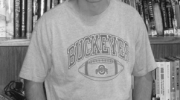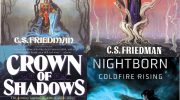 Lou Antonelli is a prolific short story writer from Texas who has been nominated both for the Hugo and Sidewise Awards for Alternate History. I had a chance to talk with Lou about writing and his upcoming, debut novel Another Girl, Another Planet. Check out what Lou had to say below:
Lou Antonelli is a prolific short story writer from Texas who has been nominated both for the Hugo and Sidewise Awards for Alternate History. I had a chance to talk with Lou about writing and his upcoming, debut novel Another Girl, Another Planet. Check out what Lou had to say below:
Welcome to SFFWorld, Lou. In your own words, who is Lou Antonelli?
A first-generation American, both my parents were teenagers in Europe during World War II and left Italy after the war. They met and married in the U.S. I was the first member of my family to speak English, complete school and attend college.
My parents’ stories of wartime were fascinating and got me interesting in the power of storytelling at a young age.
If there is one thing I would want to be known for, it is for being Patricia’s husband. I married relatively late in life – at 42 – but I found my eternal soulmate. The most perfect thing I’ve ever written was my dedication to her for my 2009 collection, Fantastic Texas:
“The only time I am ever at a loss for words is when I try to describe how much you mean to me.”
What got you interested in writing?
Learning the English language as I was growing up, I was fascinated by both the structure of language as well as its power to inform. I caught on quickly, thanks to some encouragement from the Boy Scouts, where I was a Patrol Scribe and a holder of the Journalism merit badge. I had my first newspaper article published when I was 12.
I had always been a science fiction reader, and after 30 years in journalism it occurred to me to try my hand at fiction. Never underestimate the value of a solid grounding in the English language towards getting you off to a fast start in fiction. I have never had an editor complain a story was poorly written. They’ll nit-pick little things like the plot, setting, characters and such, but not the writing.
I was in the Boy Scouts too and for a short time was a scribe. What rank did you reach?
I was a Star Scout, and a member of The Order of the Arrow. I was not a competent enough swimmer to earn merit badges crucial to becoming an Eagle Scout.
You are a prolific short story writer. What do you like most about that medium?
Being a professional journalist, I’ve been writing stories between 300 and 1,000 words for 40 years now, and it is very easy for me to write short fiction.
One virtue of writing short fiction is that you hone your craft faster and get feedback quicker. I know a number of people who started off writing novels and wasted years and hundreds of thousands of words before they found out what they were doing wrong. With short stories, the turnaround time in the slushpile is much shorter and you get the feedback you need right away.
You can also establish contacts and make a reputation faster by starting off submitting short fiction.
You have written several alternate histories, including the Sidewise Award nominated “Great White Ship”. What inspired you to create stories in that genre?
There’s an old saying that “Journalism is the first rough draft of history.” With my professional background, I find it especially personally satisfying to write stories about “What Might Have Been”.
The longest work I have had previously published, a novelette called “Dispatches From the Troubles”, which was in Greatest Uncommon Denominator No. 6 (Summer 2010), was told entirely through newspaper articles.
My educational credentials to write plausible hard s-f are negligible; I find that very difficult. There’s more technological leeway in alternate history. My alternate history really verges on fantasy.
Is there a particular historical era of history you enjoy writing in?
I seem to have the greatest affinity with the Cold War Era – “Great White Ship” was set in 1974; Another Girl, Another Planet is set in 1985. “Dispatches from the Troubles” had a strong Cold War vibe. “Hearts Made of Stone” was set in 1955. I suppose that’s partly because I was a child of the Cold War; I was 33 when the Berlin Wall came down.
Speaking of Another Girl, Another Planet, this is going to be your debut novel and it was just announced that it was picked up by WordFire Press. What is that story about and when can we expect it to be published?
A man, in the present day, describes how we was assigned a bureaucratic position on a joint U.S.-Soviet Union space colony on Mars in 1985, and how circumstances thrust him into a higher position of authority than he envisioned. That results in his uncovering a dangerous conspiracy, as well as solving a puzzling murder mystery.
WordFire Press Publisher Kevin J. Anderson said he anticipates the novel being published by the end of the year. It is currently in development.
What other projects are you working on?
Hoping that Another Girl, Another Planet will be well received, I am working on a sequel, with the protagonist being a Russian teenager in the Soviet Youth Space Program. It is tentatively titled Pioneers of the Cosmos.
Do you have any advice for aspiring authors?
Keep your day job. The competition is fierce, and you’ll write better if you are relaxed and not afraid each and every rejection brings you that much closer to starvation.
Don’t just take criticism, seek advice. If you are perceptive, you probably recognize your own flaws. Seek suggestions on how to improve your writing. People who just offer criticism and stop there are not helpful. You need input on how to address the problem they see.
Beware of writing groups and workshops where the participants tear each other down.
Persist, persist, persist. There are seven billion people in the world. There will be days you feel every single other person on the planet submitted a better story than yours. And hundreds, maybe even thousands, will.
BUT… when you hit your pace and the story comes out right, and there is a conjunction with an editor and a publication, and your story is published – it’s a feeling like nothing else.
And despite all the heartbreak and frustration and nervousness and self-doubt, right then you will know it was all worth it.
* * * * * * *
Interview by Matt Mitrovich – SFFWorld.com © 2016




